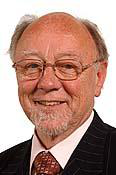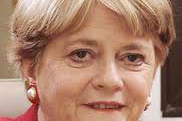MPs call for Inquiry into BBC bias in favour of assisted suicide and euthanasia

Jim Dobbin MP
Jim Dobbin, Labour MP for Heywood and Middleton, is leading a group of Parliamentarians in calling for a full inquiry into the BBC’s bias in favour of assisted suicide and euthanasia.
Mr Dobbin, chairman of the All Party Parliamentary Pro-Life Group, is the primary sponsor of an Early Day Motion tabled in the House of Commons on July 4 noting the “strong campaign waged by the BBC network … to allow euthanasia”, with five programmes broadcast in favour of a change in the law in the last three years with none arguing against the practice.
The MPs are especially concerned that while the BBC is willing to give airtime to such euthanasia campaigners as Sir Terry Pratchett to argue for a change in the law it omitted to report the passing of a resolution by the British Medical Association denouncing the bias in the constitution of the Demos Commission on Assisted Dying chaired by Lord Falconer.
Mr Dobbin has written to Lord Patten, the chairman of the BBC Trust, and to Mark Thompson, the BBC Director General, urging them to “not delay in establishing an inquiry at the highest level” given that the corporation’s Royal Charter requires it to take an impartial stand on all issues of public policy.
“We know that you are both men of the highest honour – but whatever your intentions, we know from experience that the BBC is riddled with men and women determined to promote abortion and euthanasia,” Mr Dobbin said in his letter. “We are determined, however, to do everything we can to ensure that an inquiry at the highest level is established.”
In a separate letter sent to Lord Patten on July 5 Lord Alton of Liverpool reminded the BBC Trust chairman that the BMA conference was told by its deputy chairman of that "assisting patients to die prematurely is not part of the moral ethos or the primary goal of medicine. If the legislation were to be changed, it would have serious negative consequences on the relationship between doctors and their patients".
Lord Alton wrote: "Given the wall-to-wall coverage given to Mr Pratchett et al we were therefore surprised to see no reference to the BMA's motion or votes on any BBC news coverage. If the Corporation's rationale for broadcasting the documentary equivalent of 'snuff' movies is 'public interest' might the public not also have been interested to learn the views expressed by their doctors?
"In light of the failure of the BBC to present this side of the argument and the uncritical airtime it has given to the Falconer Commission, the signatories below feel that an inquiry at the highest possible levels ought to be announced to conclude definitively whether the BBC has honoured its duty to be impartial in its presentation of this contentious and difficult issue."
The EDM in full follows:
That this House applauds the motion passed by the British Medical Association Annual Conference condemning the Commission on Assisted Dying led by Lord Falconer as biased; regrets that such an important development failed to be given coverage by any BBC news programme; notes the strong campaign waged by the BBC network supporting Lord Falconer's Commission and changes in the law to allow euthanasia; further notes this has included five major programmes that have been sympathetic to assisted dying in the last three years with none against; further notes that BBC news programmes looked ahead to the Swiss referendum on assisted suicide on the day before it took place, covered it on the day as people went to the polls and then reported the result which supported euthanasia; further notes that in comparison the BBC failed to give any coverage to the BMA motion debated by British doctors at a conference of national importance to Britain, even though the BBC news staff had a representative present; further notes this as evidence of the ingrained bias of the BBC staff on the issue; calls on the Government to inform the Lord Patten of Barnes, Chairman of the BBC Trust, and Mr Mark Thompson, the Director General, that the Corporation's Royal Charter requiring it to take an impartial stand on all issues of public policy thus disbars BBC personnel from using the network to promote and develop their own campaigns on any issue; and urges that a thorough inquiry at the highest level should be established immediately.
The full text of Mr Dobbin’s letter to Lord Patten and Mr Thompson:
Dear Lord Patten and Mr Thompson,
We enclose an Early Day Motion which has been tabled in the House of Commons (today...yesterday...this week) regarding the fact that the BBC totally ignored a five-point Motion condemning the Falconer Commission on Assisted Dying as biased which was passed with a substantial majority at the BMA Annual Delegates Conference.
In view of the fact that the BBC has given substantial coverage supporting the Commission we consider this omission to be very significant. As the Early Day Motion states, BBC news programmes looked ahead to the Swiss Referendum on Assisted Suicide on the day before it took place, covered it on the day as people went to the polls and then reported the result which supported euthanasia. We find it astonishing that in comparison the BBC failed to give any coverage whatsoever to the BMA Motion – which, after all, was debated by British doctors on British soil at a conference of importance to British people, and at which the BBC news staff was represented.
We have to say that Parliamentarians are becoming more and more cynical as are members of the public to receive letters from your personnel which insist that the BBC “is completely impartial on the issue of assisted death.”
It is very obvious that this maybe your policy – but it is almost totally ignored by your staff - that or they do not understand the meaning of “impartial”, as is obviously the case of Ms Charlotte Moore who commissioned the Terry Pratchett programme.
We enclose a brief list of some of the worst abuses and ask you to consider them.
During the last ten years a number of Early Day Motions have been tabled complaining of BBC bias on pro-life issues and many letters of complaint have been sent by Peers and MPs to the different Director Generals and to all of which we have been assured that the BBC holds no bias. We urge that you do not delay in establishing an inquiry at the highest level.
We are confident that you are both men of the highest honour – but whatever your intentions, we know from experience that the BBC is riddled with men and women determined to promote abortion and euthanasia. We are determined, however, to do everything we can to ensure that an inquiry at the highest level is established.
Yours sincerely
Jim Dobbin
Evidence of BBC Bias on Euthanasia and Assisted Suicide
The BBC surely cannot describe as impartial the Panorama documentary, I'll Die When I Choose, in which Margo Macdonald MSP was given the floor to explain and promote her End of Life Assistance (Scotland) Bill just before it was tabled. It was shown no less than four times between December 8-14 2008. Scottish MPs, thankfully, did their homework and Miss Macdonald suffered a huge defeat when her Bill was thrown out by 85 votes to 16.
Neither could one describe as impartial or neutral the 90-minute docudrama A Short Stay in Switzerland devoted to the assisted suicide in Switzerland of Dr Ann Turner. It was launched with a major BBC press campaign, featuring Julie Walters, the actress, stating why she was so delighted to appear in the pro-assisted suicide film. Without any doubt whatsoever both the film and the BBC press campaign set out to promote the legalisation of assisted suicide.
It was not the first programme on Dr Turner. When she originally went to Switzerland in January 2006 to commit suicide she was accompanied by Fergus Walsh, the BBC health correspondent, and a full BBC crew who filmed the event, including Dr Turner sipping champagne with her three children before she drank her cocktail of barbiturates. Parts of the film - including the appearance of Mr Walsh - were used as background in A Short Stay in Switzerland.
A further example of BBC bias was the choice of Sir Terry Pratchett to give the 34th Richard Dimbleby Lecture, Shaking Hands With Death, when he claimed the right to assisted suicide because he had been diagnosed with Alzheimer's disease. A selected audience cheered him.
There are many examples of BBC news coverage of the deaths of Reginald Crew, Diane Pretty and others.
A further example involved Jonathan Dimbleby, who invited Deborah Annetts to join the panel on the radio programme Any Questions(17th March 2006). At the time Miss Annetts was the chief executive of what was then the Voluntary Euthanasia Society (now Dignity in Dying). On the programme she gave the audience a lurid description of Diane Pretty's death. There was nobody to challenge her. Yet, according to statements made at the time of Mrs Pretty's death by the director of the hospice where she died and by the Motor Neurone Disease Association, Miss Annett's claims were totally untrue. However, when we complained of bias we were assured that this was not true and that Any Questions would be inviting a representative of the pro-life movement to take part in a programme. That was in March 2006, We are now in July 2011 and still no such invitation has been issued.
Finally, we wish to draw your attention to yet another pro-euthanasia propaganda assault when on February 15th 2010 the Inside Out Programme on East Midlands featured BBC producer Ray Gosling "confessing" to smothering, some years before, a gay lover who had AIDS. After an exhaustive police investigation into the claim it turned out to be pure fantasy. However, in the meantime the BBC machinery had blown it up into a massive international news story. It received worldwide coverage. Perhaps not so coincidentally it was just prior to the Director of Public Prosecutions reporting on his assisted suicide prosecution criteria.
We are well aware of problems the BBC must face with dramas such as A Short Stay in Switzerland and the Dimbleby Annual Lecture. Nonetheless, these formed mainstays in a long-term campaign. We stress that there must be some way in which the BBC can counter-balance such programmes and ensure greater impartiality.
Phyllis Bowman




















